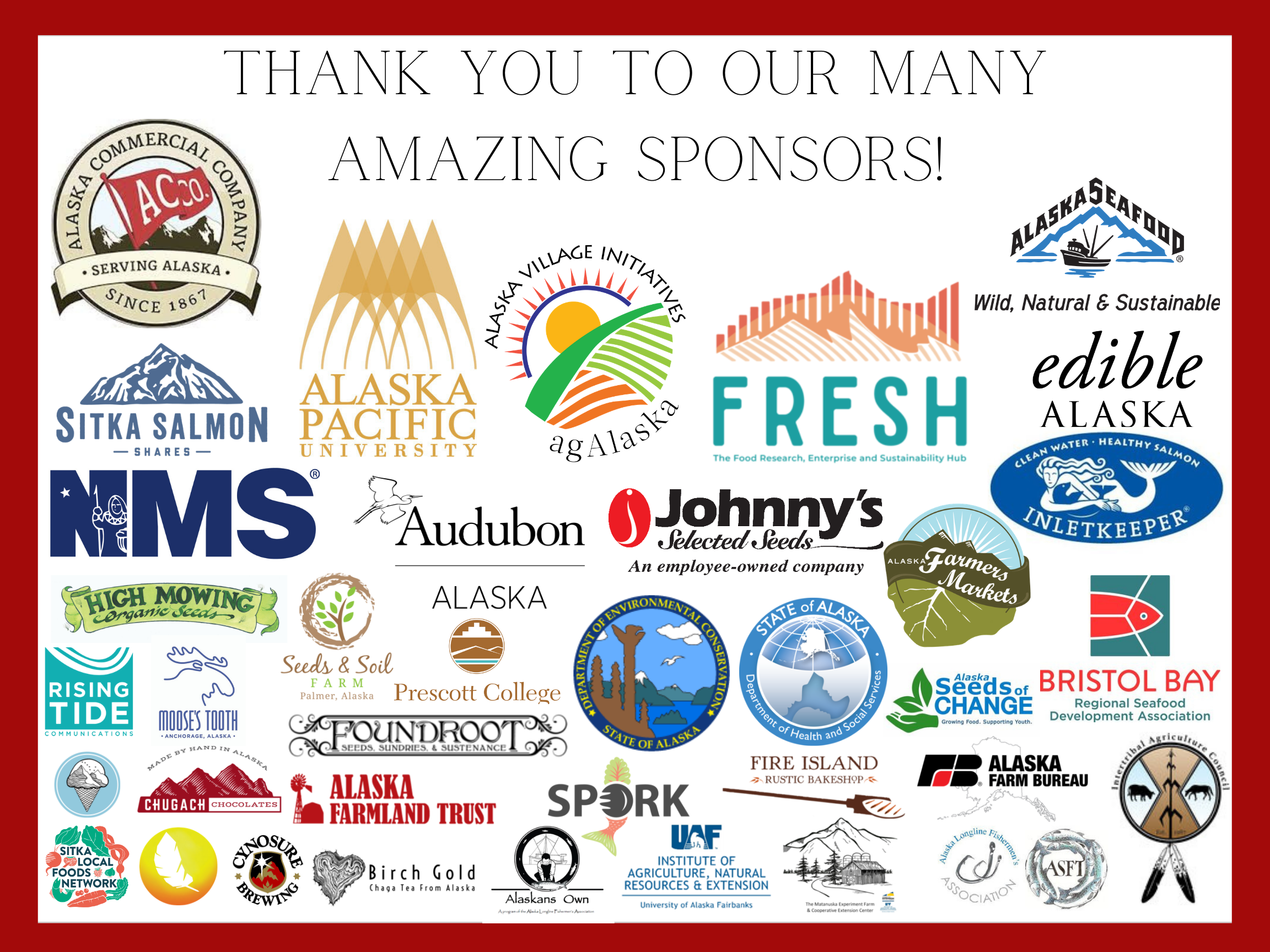by Heidi Rader, Robbi Mixon, Charles Bingham, & Lorinda Lhotka
November 6-7, 2020
Virtual Alaska Food Festival & Conference
For more than a year, the AFPC Conference Planning Committee has been working diligently to create an inclusive, informative, and engaging experience for conference attendees. This conference edition had the added challenges of presenting a virtual event while navigating new technology during the COVID-19 pandemic. This challenge also provided new virtual opportunities for both presenters and attendees to participate, removing barriers like travel costs. In fact, we had over 275 attendees and presenters, representing 59 unique communities: 39 within Alaska alone, 9 states and the Virgin Islands.
This fifth semi-annual event previously took place in Anchorage in 2014 and 2016, in Fairbanks in 2017 and Homer in 2019. This year, the conference was scheduled for Anchorage before going virtual due to the pandemic.
THE GOALS OF THE CONFERENCE AND FESTIVAL ARE TO:
(1) increase awareness of Alaska food issues among the general population;
(2) provide training, resources, and networking opportunities to increase involvement in local food issues by community members and decision makers; and
3) increase connections and build community between the public, Alaska food businesses, NGOs, gov’t entities, Tribal entities, and others to support local economic development and innovative solutions.
For our 5th semi-annual conference, we partnered with:
Alaska Village Initiatives is a non-profit membership-based company dedicated to improving the well-being of rural Alaska communities, families, and individuals. AgAlaska affords rural villages support and resources needed to begin community gardening farming and ranching. Information and links provide current grant opportunities, best garden practices, and resource links to government and non-government agencies.
FRESH, Food Research, Enterprise, and Sustainability Hub of the North works to catalyze the modern food landscape of tomorrow by honoring the living traditions of yesterday and harnessing the innovative spirit of today’s Circumpolar North.
Alaska Pacific University is small liberal arts college located in Anchorage, Alaska, that emphasizes experiential and active learning. APU, along with UAA, is home to FRESH.
The conference focused in particular on tribal food sovereignty, rural food systems, and food entrepreneurship.
The conference kicked off with a film called “Gather,” which focuses on the “. . . growing movement amongst Native Americans to reclaim their spiritual, political and cultural identities through food sovereignty, while battling the trauma of centuries of genocide.” This was co-hosted by Native Movement.
Simply put, food sovereignty is defined as ensuring that people have the right to sufficient, healthy and culturally appropriate food and that is borne out in hunting, fishing, gathering and agriculture policies.
2020 KEYNOTE SPEAKERS & SPECIAL GUESTS:
VALERIE SEGREST
NATIVE AMERICAN AGRICULTURE FUND
REGIONAL DIRECTOR, NATIVE FOOD & KNOWLEDGE SYSTEMS
DANIELLE NIERENBERG
FOOD TANK,
CO-FOUNDER & PRESIDENT
SOMMER SIBILLY-BROWN
VIRGIN ISLANDS GOOD FOOD COALITION,
FOUNDER & EXECUTIVE DIRECTOR
ELISE KROHN
WILD FOODS & MEDICINES
HERBALIST, NATIVE FOODS SPECIALIST, EDUCATOR, AND AUTHOR
MARTHA PEARSON, HEALTH PROMOTION DIRECTOR &
KATE FOSSMAN, RDN, LD, CDE & NUTRITION SPECIALIST
SOUTHEAST ALASKA REGIONAL HEALTH CONSORTIUM
BREN SMITH
GREENWAVE & THIMBLE ISLAND OCEAN FARM
EXECUTIVE DIRECTOR
ANNE PALMER
JOHN HOPKINS CENTER FOR A LIVABLE FUTURE
PROGRAM DIRECTOR, FOOD COMMUNITIES & PUBLIC HEALTH
Conference highlights (and we acknowledge there are too many to list here) included:
Carolina Behe with the Inuit Circumpolar Council spoke with elders and others about what food security and food sovereignty means from an Inuit perspective, some of whom co-authored a report of more than 100 pages on the topic.
Valerie Segrest, with the Native American Agriculture Fund, spoke about how policy and grant programs can help address food sovereignty. I should add that they have awarded 11 grants in Alaska this year and are the leading funder of projects that address needs and issues related to tribal food sovereignty and justice.
Regenerative Ocean Farming featuring farmers, businesses and biologists on the theories, models and day-to-day challenges of ocean farming featuring Bren Smith from GreenWave, Dune Lankard with the Native Conservancy, Margo Reveil of Jakolof Bay Oyster Co., Marissa Wilson of the Alaska Marine Conservation Council; and Melissa Good, Hannah Wilson and Ginny Eckert of Alaska Sea Grant.
Martha Pearson, Kate Fossman and Georgie Davis-Gastelum of the Southeast Alaska Regional Health Consortium presented on adaptability in healthcare with Alaska’s geographic challenges. They reviewed examples of SEARHC health outreach endeavors to highlight how clinics and the community can work together.
FRESH Chef Fest demos from Chef Amy Foote of the Alaska Native Medical Center on their traditional foods initiative, Chef Flora Deacon featuring low bush cranberry bison sloppy jo’s on sweet potatoes, and UAF Culinary Professor Chef Sean Walklin “Cooking with Alaskan Seafood.”
Alaska Division of Agriculture provided updates on their Division and the Alaska Grown program, the Food Security Micro-Grants, and Specialty Crop programs, Industrial Hemp Pilot Program, and more.
Meda Dewitt, Tlingit traditional healer and ethnoherbalist, spoke passionately about the importance of traditional knowledge around plants as a way to heal and improve food security and health in a changing climate. Several speakers spoke about how they managed to include traditional foods (like seal oil, herring eggs, caribou) in their medical facilities and how integral that was for nourishing their Alaska Native patients, especially now, when they are not allowed visitors.
Sommer Sibilly-Brown spoke about her efforts in the Virgin Islands, where she founded the Good Food Coalition. Much like Alaska, the Virgin Islands import most of their purchased food. Although she was far away physically, she connected deeply with many of us in the virtual room with her powerful message of what food justice means and is and her efforts to do something about it.
Heidi Rader spoke about the Tribes Extension Program and how it is well suited to help tribes in Alaska address food security and sovereignty challenges. The program is funded by a federal grant and can also focus on promoting language, traditional knowledge and cultural practices. If you'd like to learn more, please complete this short survey
Several staff from the Aleutian Pribilof Islands Association spoke about their latest efforts related to promoting traditional foods. The project, called Qaqamiigux (to hunt or fish for food and collect plants, or subsistence), seeks to preserve and sustain traditional knowledge centered around food. In addition to a cookbook and Head Start curriculum, they have recently created three films. All of these great resources can be found here.
AFPC hosted sessions about food system advocacy priorities, creating localized food groups, and reviewed upcoming Regional Food System Partnership grant activities. In our closing session AFPC board members explained ways to get involved through working groups and committees and made plans to have more regular gatherings - 18 months is just too long to wait to get together!
And so many more wonderful presentations! Take a look at our agenda here. The over 60 presentations were recorded and many of them will be posted on our website by January 2021. Stay tuned!
2020 Alaska Food Hero Awards!
Each conference, the Alaska Food Policy Council recognized individuals and organizations with the “Alaska Food Hero Award.” Selection is based on work they have been involved with over the past 18 months. Awardees demonstrate a substantial impact on Alaska’s food system, transform an aspect of their community’s food system, and make a difference for Alaska’s prosperity, health and self-reliance. This year’s honorees are:
Native Village of Savoonga Reindeer Crew
Marsh Skeele (Sitka Salmon Shares)
Chef Amy Foote (Alaska Native Medical Center)










